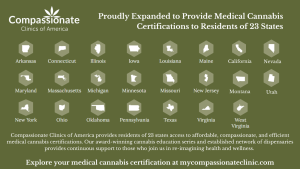What Do We Hope to See for Medical Cannabis in 2023?
2022 has been a great year of growth for Compassionate Clinics of America as we celebrated our fifth anniversary and expanded to serve medical cannabis patients in 23 states.
The legalization of recreational cannabis is quickly catching on across multiple states, currently with 21 states and Washington, D.C. legalizing the plant for adult use alongside medical cannabis programs. However, despite the increased legalization of recreational cannabis, there are several reasons why medical cannabis programs, like the one we provide at Compassionate Clinics of America, exist and continue to grow.
There are several benefits to having your medical cannabis certification in a recreational state, especially as new discoveries are made about the medical benefits of cannabis, and more is learned about the other components of the plant that add to its medicinal properties.
As we near 2023, here are a few things we hope to see for medical marijuana this coming year:
Increased Understanding of Terpenes
For too long, cannabis patients and users have been under the impression that cannabis use is all about THC. As more is revealed about the plant, we are learning so much more about the other components of the plant that add to its nuanced effects.
Terpenes are the aroma and flavor compounds in cannabis that contribute to specific effects; terpene profiles are what determine whether a cannabis cultivar (“strain”) will have a more relaxed or energetic effect.

These nuances have been known as “indica” or “sativa” or “hybrid”, but we’re learning that cannabis is much more than these simple classifications. We hope to see more brands educate about terpene profiles to help patients choose products to target specific desired effects with more research emerging on the medicinal and therapeutic properties of terpenes as they exist in cannabis and other plants.
More Knowledge of Minor Cannabinoids
Throughout our patient education series, we have talked about certain minor cannabinoids for medical cannabis patients to have on their radar such as CBN, THCV and THCA. There are dozens and dozens of cannabinoids in cannabis, however, much of the cannabis community and existing research is still focused only on THC and CBD.
There is still so much to be known about the minor cannabinoids we do know of, and the ones still yet to be discovered. We have highlighted, specifically in the articles on THCV and CBN how some brands will take one research study about a minor cannabinoid and will use the results to build a brand. For instance, many are being told that THCV can help one lose weight and suppress appetite, while others are sold products with CBN telling them it’ll help them sleep, which has some merit of truth, but it’s not the entire story on these cannabinoids.

While there are some merits to these claims, increased research due to increased legalization will help uncover more specific truths on minor cannabinoids, including what they do, and how they work alongside other cannabinoids and parts of the plant.
This video helps explain some of the options the U.S. government has for the legalization of cannabis while also help you understand some of the terms around it:
Increased Cannabis Reciprocity
In our article “Travel Tips for Medical Cannabis Patients”, we discussed that ten states across the USA have programs cannabis reciprocity programs through which they honor the medical cannabis certifications of visitors from other states.
These programs help medical cannabis patients feel free to discover other parts of the country while not having to worry about not having access to their cannabis medicine. We hope that these programs will increase between states so that medical cannabis patients have more options to travel and don’t feel confined only to states that offer reciprocity.

The Illinois Department of Public Health offers a helpful breakdown of all the states that offer cannabis reciprocity and the process through which to take advantage of these programs as visitors.
To go along with this, we’re also seeing more airports have “Cannabis Amnesty” boxes that will allow travelers who are going out of state or country to ditch their stash before flying to avoid any felony offenses.
Continued Medical Certifications in Recreational States
As we mentioned above, there are several benefits to holding your medical cannabis certification in a recreational state, especially as more states go legal over time.
Those who receive their medical cannabis certification in a recreational state have increased legal protection, higher potency and possession limits (in most cases), pay significantly lower taxes on products, and can participate in state cannabis reciprocity programs, among others.
Compassionate Clinics of America has now expanded to serve 23 states with medical cannabis certifications: Arizona, Arkansas, California, Connecticut, Delaware, Georgia, Illinois, Iowa, Louisiana, Maine, Maryland, Massachusetts, Michigan, Minnesota, Missouri, Montana, Nevada, New Jersey, New York, Ohio, Oklahoma, Pennsylvania, Texas, Utah, Vermont, Virginia, & West Virginia,. When we were considering where to expand, we did not use the existence of legal recreational cannabis as a deterrent, knowing that medical programs have a strong space within the cannabis movement as a whole.

As a clinic, we vow to continue to spread education about holding a medical cannabis certification, and it is our hope that those who are using cannabis for medicinal reasons continue to recognize the vast benefits of participating in a state medical cannabis program.
More Equitable Spaces & Opportunities
Cannabis is not used by one racial or economic group over another, and thus, the industry surrounding the plant should reflect the diversity of people who use it. When the cannabis industry first came into fruition, many groups were left out of being able to participate, namely because of the disproportionate criminalization of Black, Indigenous, and people of color for cannabis crimes.
Luckily, many of the states that we serve have social equity programs baked into their cannabis legislation to ensure that the industry is equitable and truly reflective of those who use the plant. One company, BIPOCANN, is working hard to ensure this is a reality. Be sure to check out some of the stories of people who have faced tremendous hardship but “made it” through perseverance and ensuring all people had a voice and space in the industry.

Here is an example of such programs: In 2021, it was shown that Ohio had 58 medical dispensaries, yet only 9 of which were owned by persons of color. To increase equitable access to opportunities in plant medicine, The Ohio Board of Pharmacy announced in 2021 another 73 planned licenses would be awarded via lottery.
We hope to see a significant change in the industry where no one is left behind, and everyone is given equal opportunity.
High Hopes for 2023
In the five years that Compassionate Clinics of America has existed, we have seen a tremendous amount of change that confirms to us that the cannabis industry, and what we know about the plant herself, still has a long way to go.
We are proud to be entering 2023 serving 23 states with medical cannabis certifications: Arizona, Arkansas, California, Connecticut, Delaware, Georgia, Illinois, Iowa, Louisiana, Maine, Maryland, Massachusetts, Michigan, Minnesota, Missouri, Montana, Nevada, New Jersey, New York, Ohio, Oklahoma, Pennsylvania, Texas, Utah, Vermont, Virginia, & West Virginia, and we only see a bright future ahead of continued growth.
If you or someone you love are interested in exploring a medical cannabis certification, reach out to us to connect with one of our compassionate health care practitioners who will help you take advantage of the medical cannabis program in your state.
Happy New Year from the staff and health care practitioners of Compassionate Clinics of America!























